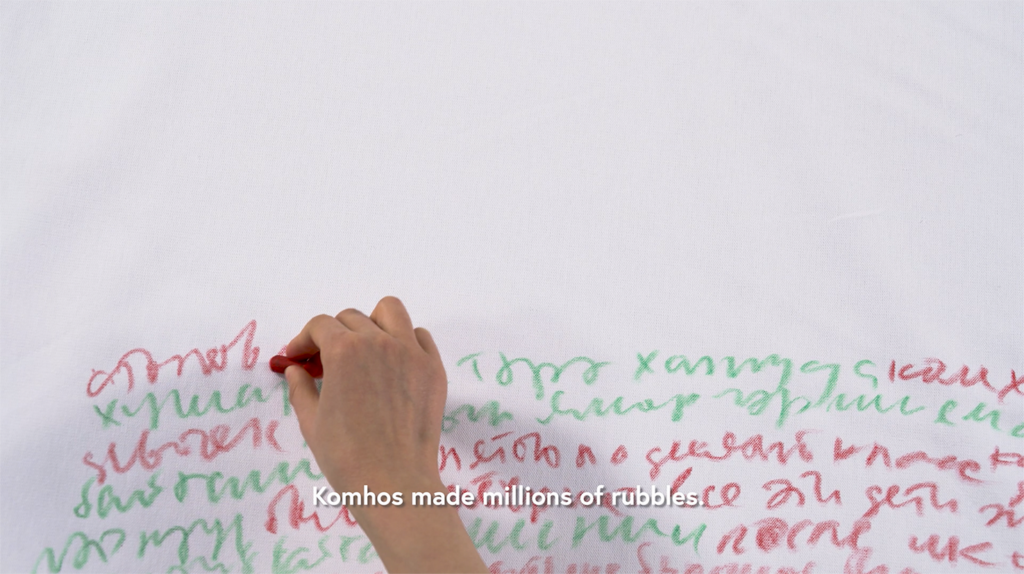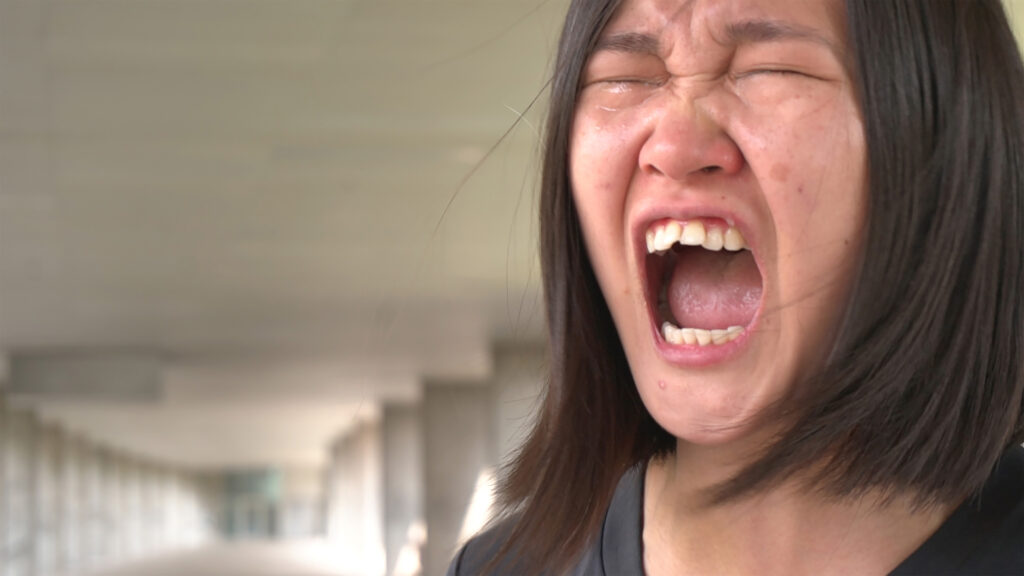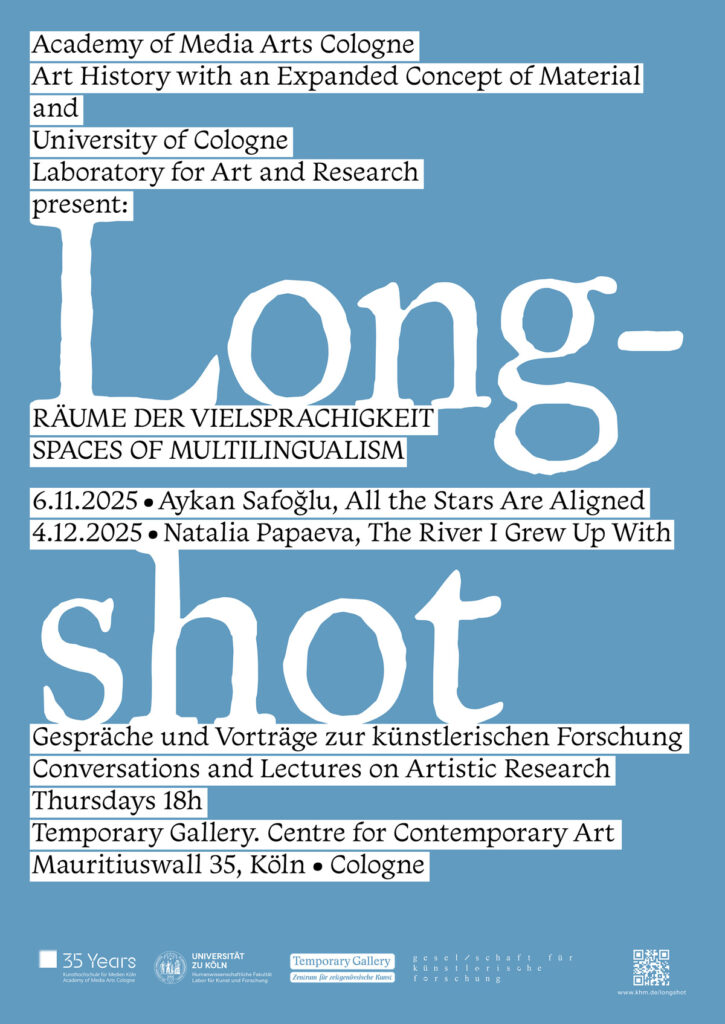THE RIVER I GREW UP WITH
An evening with Natalia Papaeva from a performance to a performance video
Thu 4 December, 6 p.m.
Part of the series Longshot. Räume der Vielsprachigkeit | Spaces of Multilingualism.
Public talks and lectures on artistic research – presented by the Academy of Media Arts (Art History with an Expanded Concept of Material), the University of Cologne (Laboratory for Art & Research), the Society for Artistic Research in Germany (gfkd), and Temporary Gallery, Cologne.
“Spaces of multilingualism” unfold in overlaps of the spoken, written, heard, and read. In two guest lectures, we will focus on multilingual oral and written transmissions, with translations, recordings, and embodiments of various languages of art and literature. These create gateways that challenge the supposed singularity of a language by not only fanning out concepts, but also what they seek to convey. This gives rise to unique rhythms, tonalities, and corporeal techniques that are worth being contextualized and heard.
THE RIVER I GREW UP WITH
An evening with Natalia Papaeva from a performance to a performance video
Thu 4 December, 6 p.m.
With a Lecture performance by Natalia Papaeva on the context of Sovjet and Russian colonialism and two screenings:
Screening of an excerpt of The River I Grew Up With (2023)
1-channel video performance, 30 min., camera: Oleg Revenko
In The River I Grew Up With, Natalia Papaeva recalls, in a dialogue with her mother, the landscape surrounding the East Siberian village of Orlik and the stories interwoven with family memories. Mixing the Buryat and Russian languages, they talk as a duo about their village, Soviet history, anecdotes from the neighborhood, and ghost stories. The bilingual is conveyed in their conversation both acoustically through two sound tracks and visually through a shared text of Russian and Buryat words in red and green. Through family interaction, the artist maps out a fragmentary verbal map, allowing us to experience a landscape in the process of dissolution and its changing culture.
Followed by a screening of Yokhor (2018)
1-channel-video performance, 11 min., camera: Oleg Revenko
"I forgot my mother tongue. And I am not the only one. Many people in my native Buryatia (Siberia) are losing their language. The Buryat language is one of nearly 2600 languages likely to disappear. Of all 6000 languages in the world, 43% are endangered and I am going through this process myself. In my performance, I am singing two sentences from a Buryat traditional song. The only two sentences I remember." – Natalia Papeva
Yokhor – the artist sings a traditional dance song in Buryat in front of the staggered struts of an underpass in a public space. Repeated many times, it becomes a lament and, in a crescendo, a single desperate and angry cry, during which her voice sometimes fails. In this swan song to the transience and disappearance of her language, Papaeva articulates the brutality and pain of its eradication. It is structures of coercion, power, and subjugation that lead to its extinction, and to which she erects an ephemeral and resistant monument in repetition and time-based performance.
Natalia Papaeva is a visual/time-based artist born and raised in Buryatia (Eastern Siberia) and based in the Netherlands. Her artistic process is set in motion with text – read or written – which then translates into movements, images, sounds. Often, her endangered birth language materializes in her practice. It brings the Buryat language from the domestic sphere into the public realm and by doing so she resists the notion of endangerment. She holds a BA from the Royal Academy of Art, The Hague. In 2018, she won the TENT Rotterdam Award and the IMD Department Prize from KABK for best video work. In 2025, she received two awards for her sculpture, The Fire in My Mind: the Frans de Wit Prize and the Business Platform Schipholweg Prize. From 2022 to 2024, she was a resident at the Rijksakademie in Amsterdam. Her work has been exhibited at HKW, M HKA, Kasseler Kunstverein, the Asian Biennial, and the Ulaanbaatar Biennial, and is held in both institutional and private collections internationally.
Konzept und Organisation:
Anna Bromley, Leon Filter, Lilian Haberer, Karina Nimmerfall.
Mit freundlicher Unterstützung von:
Reihe 35 Jahre KHM
gkfd– Gesellschaft für künstlerische Forschung
Temporary Gallery
Bild:
1—Natalia Papaeva, The River I Grew Up With (Still), 2023
2—Natalia Papaeva, (Still), 2018


